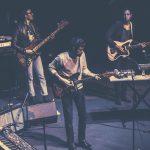Indie-folk eccentric Devendra Banhart charms Union Transfer (photos, review)

Indie-folk luminary Devendra Banhart played a wonderfully fun and slightly kooky show at Union Transfer Monday night to a packed crowd, despite the rescheduled date. The show was part of Banhart’s tour promoting his new album, Mala, which was released in March.
Opener Rodrigo Amarante took the stage shortly after 9, jjokingly apologizing that no, he was not Devendra, and thanked the audience “for facing this way.” Amarante, a Brazilian musician of Los Hermanos and Little Joy, proved to be a great warm-up and was very well-received by the audience in the front; his first few tunes were pretty quiet, and his soothing voice (singing both in English and Portuguese) complemented the low hum of the crowd back at the bar. When joined by Banhart’s band, Amarante blasted into some funkier, Latin-infused tunes before closing off the set alone with a beautiful song entitled “The Ribbon.”
Banhart waltzed onstage soon after Amarante left, and started off with the older tune “The Body Breaks.” Although he sported his new, more clean-cut look, Banhart was nonetheless eccentric. Lanky and weirdly charming, Banhart’s vibrato was even more prominent live as he crooned through “Little Yellow Spider.” A few songs in, he was joined by his band, including Amarante on guitar and keyboards. The night featured a lot of songs from Mala, including the first two awesome singles “Für Hildegard von Bingen” and “Never Seen Such Good Things.” The new tunes were well-dispersed between older Devendra classics and crowd favorites like “Baby” and “Lover,” but unfortunately, the well-varied set was definitely missing more of Banhart’s Spanish songs.
Mala itself is a less freakish and playful, more low-key, almost more sophisticated album compared to Banhart’s previous work. Still, the Venezuelan-American singer kept the atmosphere light and fairly upbeat, sporting a genuine and sometimes mischievous smile the entire night. His trademark erratic hand and arm movements (definitely not Italian) were in turn genuinely endearing and smile-inducing. On the tracks where he wasn’t playing guitar, Banhart’s performance became theatrical – dramatically cry-singing into his microphone one second, then immediately skipping to the other end of the stage with a glint in his eye. It all made you question what was serious, what was a joke, and why could he swing his hips better than a girl?
Banhart (along with his band) is one of those musicians whose talent and musical energy seem to transfer very well from studio recordings to the stage, often coming alive and sounding even better live. One of the most standout tracks was the 8-minute long “Seahorse,” which started off mellow, flowed into a rhythmic blues-tinted melody, and crescendo-ed into a loud, surprisingly powerful, awesomely raucous rock n roll jam.
As he returned onstage for the encore, Banhart first played “Won’t You Come Over” from Mala, and then blasted into a more upbeat, energetic version of the favorite “Carmensita” to close the set off. You couldn’t help but dance; even though the song was an obvious choice for Banhart’s last song, it was the best way to end the show. Most of us probably weren’t sure exactly what he was singing in Spanish, but it didn’t stop the crowd from cheerfully humming along as they left into the drizzling rainy night, which didn’t seem so dreary anymore.




